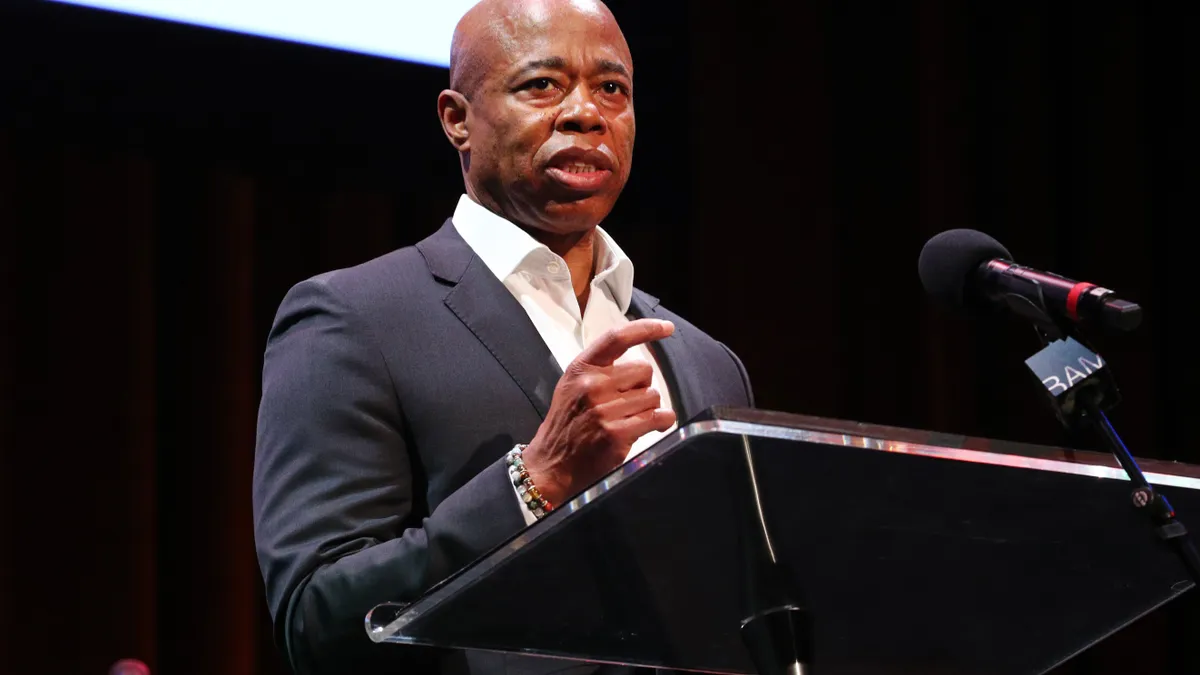Dive Brief:
- New York City Mayor Eric Adams announced on Monday a new Mayor’s Office of Climate and Environmental Justice to better integrate justice work within the city's comprehensive approach to climate. The office consolidates and unifies existing agencies focused on resilience, sustainability, environmental coordination and environmental remediation.
- Adams also announced new appointments to the climate team who he said will support the administration's work to "offset the effects of climate change and unnecessary carbon emissions," with plans to expand solar power installations and other citywide resilience and clean-energy infrastructure. He also pledged to complete the city's "first comprehensive study of environmental justice."
- Environmental justice advocates welcomed the commitments. "The nature of environmental justice is about intersectionality," said Eddie Bautista, executive director of the NYC Environmental Justice Alliance (NYC-EJA). "If your government is siloed, by extension, your policies are siloed." At the same time, Bautista said that the newfound attention and formalization of environmental justice (EJ) in city operations raises the stakes. "We intend on holding the mayor's office accountable to that title."
Dive Insight:
The decades-long work of grassroots urban environmental justice activists is increasingly capturing the attention of city governments. But cities vary in how far along they are in assessing and addressing EJ problems.
Cooper Martin, director of sustainability and solutions at the National League of Cities, said in an email that New York's move is "part of an emerging trend in which cities are formally recognizing the connection between climate change, environmental justice and equity."
Martin pointed to a range of examples, including ballot initiatives in Portland, Oregon, and Denver that led to tax revenue for funds meant to support "climate action that advances racial and social justice" and "efforts focused on the communities most harmed by climate change," respectively. In a separate example, Providence, Rhode Island, opted to adopt a climate justice plan that it followed up with legislation to enshrine EJ work into the city charter.
Other cities, including Boston and Seattle, also seek to channel certain EJ actions through their Green New Deal programs. Philadelphia this week announced its first environmental justice advisory commission, which will engage with front-line communities and establish an EJ agenda.
In New York, former Mayor Bill de Blasio's administration took some steps on environmental justice, including signing a pair of laws in 2017 meant to improve collection of and access to environmental justice data, and to support the creation of a citywide plan. A long-debated waste equity law, intended to reduce transfer station capacity in specific communities, was also signed in 2018. But much implementation and additional work remains, according to EJ advocates. Harlem-based organization WE ACT for Environmental Justice called on the city to provide $1 million in annual funding to the EJ program beginning in fiscal year 2022.
According to Bautista, one of NYC-EJA's policy priorities for the year is to monitor whether the upcoming commercial waste zone system will improve conditions for historically overburdened communities. And the group is already looking ahead to how New York will prepare for revisiting its Solid Waste Management Plan in 2026. "There's so many different solid waste policies the city's going to be grappling with," Bautista said.
Adams named Kizzy Charles-Guzman executive director of New York's new office. Her previous experiences include working to develop the Cool Neighborhoods NYC strategy to address effects from rising temperatures and heat waves. She'll report to Rohit Aggarwala, a fellow alum of former Mayor Michael Bloomberg's administration, who was appointed both chief climate officer and commissioner of the Department of Environmental Protection. Aggarwala's resume includes the creation of the Mayor’s Office of Long-Term Planning and Sustainability under Bloomberg.
"Making progress on climate requires not only good policies but also driving resilience, decarbonization, and environmental justice into daily city operations," Aggarwala said in a statement.












